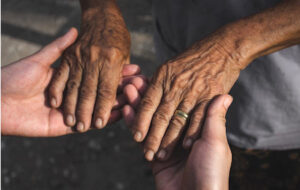Life is a gift. Giving back out of a sense of gratitude fulfills the purpose of the gifts we have.
Giving from gratitude not only helps others, but also brings blessings in the form of joy and peace within ourselves.
It is because of this that giving is a great gift.
Aside from money and objects, we can share our talents and skills. Small things such as a friendly smile, kind words, a gentle touch, hugs and a listening ear can be great gifts. Even our thoughts expressed as prayers and blessings can help to uplift others.
When it comes to giving, it’s important to remember that how we give matters more than what we give. In other words, our intentions and attitude behind giving are more significant than the gift itself.
The highest form of giving comes out of love and gratitude. When giving is motivated by these noble emotions, it expresses in the following ways:
Signs of the highest form of giving
1. The giving is unconditional
When the giving is unconditional, you have no desire to gain anything in return. Giving itself is its own reward. You give simply because you want to give. You gain joy and satisfaction from the act of giving and ask for nothing else.
You can help in small but important ways. You may use your computer skills to help someone learn how to use the programs on her device. You may help an elderly neighbour take out his trash every week or babysit for a friend.
And when you give something tangible, you don’t insist that the recipient use it in any particular way. She is free to keep it or not, use it or not, and basically do whatever she likes with it.
In contrast, when giving is conditional, it comes with many expectations—said and unsaid. “I’ll scratch your back if you’ll scratch mine” is the attitude.
The giver offers gifts, services and even flattery so as to gain some monetary rewards, special favors or privileges in return. When the giving is not reciprocated, the giving stops abruptly and the relationship is broken. This is often the case in the business world.
In conditional giving, the giver may insist that the gift be used in a certain way, place or time. For example, if she gives you a vase as a house-warming gift, she expects that you like it and will use it. She may hint that her vase would look perfect on the table beside your sofa, or that it would be more suitable for the flowers you have in another vase.
In unconditional giving, you make no demands whatsoever about how your gift should be used.
2. Once given, the gift is quickly forgotten
When your giving is without strings, your gift is a sincere expression of gratitude, friendship, or love. There is no pride or self-congratulation. You quickly forget what, how much and when you gave.
 Very often, the recipient or others will have to remind you of your gift. This may happen when you give your time and attention to listen to someone in need of a listening ear and encouragement. You may not think much of it at the time, but the one with whom you shared your time with will cherish your gift and not easily forget it.
Very often, the recipient or others will have to remind you of your gift. This may happen when you give your time and attention to listen to someone in need of a listening ear and encouragement. You may not think much of it at the time, but the one with whom you shared your time with will cherish your gift and not easily forget it.
On the other hand, when someone gives to get something in return, the giving is never forgotten. She often reminds you and others of her gift, implying that she is waiting for you to reciprocate the favour.
Even if she may not want any tangible reward, expecting praise from others also counts as conditional giving and spoils the joy of giving.
3. Giving is done readily with sincerity and enthusiasm
Another expression of the highest form of giving is that you are eager to give and share. When you find someone to help or a genuine cause to support, you waste no time in giving. You give readily, sincerely and with enthusiasm. You never need to be reminded to give.
However, someone who is not genuine in their desire to help will not readily part with her time, money or expertise.
She will have to be asked many times to give or donate. Even when she agrees, she will keep postponing, making up some excuse or the other. Finally, when she does give, she gives reluctantly, resentfully and with a lack of concern.
4. Giving is done with humility and respect
A humble, modern day saint, Rev. J.P. Vaswani once said that when we get a chance to help others, we should thank them for giving us the opportunity to help. Without someone to receive our gift, we would not gain the benefit of being of service. What’s more, the recipient of our generosity is allowing us to earn karmic merits for our actions.
 When you have such an attitude, you will feel that you are actually giving to yourself when you give to others. Naturally, your giving will be done with humility and respect. This promotes your inner growth and helps to break down the ego. Read, The REAL reward of giving.
When you have such an attitude, you will feel that you are actually giving to yourself when you give to others. Naturally, your giving will be done with humility and respect. This promotes your inner growth and helps to break down the ego. Read, The REAL reward of giving.
By comparison, someone who only gives to get something in return will feel she is doing you a favour. Inwardly, she expects something back for her “generous” gesture. So, she may feign humility and respect, while inwardly feeling disdain and impatience.
5. Only the best is given
When you feel a strong sense of gratitude for the blessings in your life, you want to give back to serve and uplift others.
And so, you give the best of what you have and don’t hold back on the quantity or quality of your gift. The items you donate are what you would want for yourself and more. They may be food, clothes, household and personal care items, gift cards—practically anything that is useful and needed.
You give generous monetary donations remaining anonymous when you can. You may volunteer in the community, or you may mentor and help others in need of your unique skills and talents. You enjoy giving your best to others.
In contrast, a person who does not feel any gratitude or obligation to give back to others will not give. When she does give, she will only give what she doesn’t like or want. Her donations may be in bad shape, poor quality or in need of repair.
6. There is a feeling that one could be doing more even when much is given.
A generous giver never feels satisfied that she has given enough. With love and gratitude in her heart, she feels she could be doing more. She goes out of her way to give and serve others.
By comparison, if a miser is made to feel obligated to give her time, energy and skills for others, she does so grudgingly and only the barest minimum required of her. She will certainly not go out on a limb to help others. She guards her time, energy and resources with a fierce tenacity.
The gifts of giving
 Giving that is motivated by love and gratitude cultivates humility and an inner sensitivity to the needs of others. It helps to break down selfishness and attachment to material goods. All these things advance our spiritual growth. Read Give, serve and grow.
Giving that is motivated by love and gratitude cultivates humility and an inner sensitivity to the needs of others. It helps to break down selfishness and attachment to material goods. All these things advance our spiritual growth. Read Give, serve and grow.
The joy of a selfless act lies in the act itself and not on any outer rewards.
Such selfless giving is indeed noble and a great gift.
*Read more about the highest, mediocre and lowest types of giving:
Like this post? Sign up for the free fortnightly Spiritual Solutions Newsletter and receive the latest articles, news and updates in your email inbox!














Beautifully said! These days I see so many videos on social media of people filming themselves helping a homeless person or a senior. So many people applaud their “generosity” when it is clearly a publicity stunt meant to stroke their ego. A person who gives genuinely and from the heart doesn’t go around “milking compliments.”
Thanks Nava. Yes, good point! A person genuinely interested in helping would jump right in to help without looking around to see if anyone was paying attention to what he was doing.